Second Status Report on the Project 'KEEP THE READING QUEUE UNDER CONTROL'.
Successes
- Read - Panic, Catherine Jinks (to be reviewed at Newtown Review of Books)
- Read - Cold Truth, Ashley Kalagian Blunt (to be reviewed at Newtown Review of Books)
- Read - The Accident on the A35, Graeme Macrae Burnet (review pending)
- Read - Three Boys Gone, Mark Smith (review pending)
- Read - The Housemate, Sarah Bailey (review to be published here 25th February)
- Added a LOT of Ngaio Marsh entries (Ngaio Marsh 2025 Entrant List)
- Added a LOT of other books (Last Fortnight)
Failures
- Didn't manage to get to an older book
- Reshuffled the stack too many times, still didn't get it properly in order (I blame the cats who keep knocking the damn thing over!)
- Went to the library when I promised myself I wouldn't
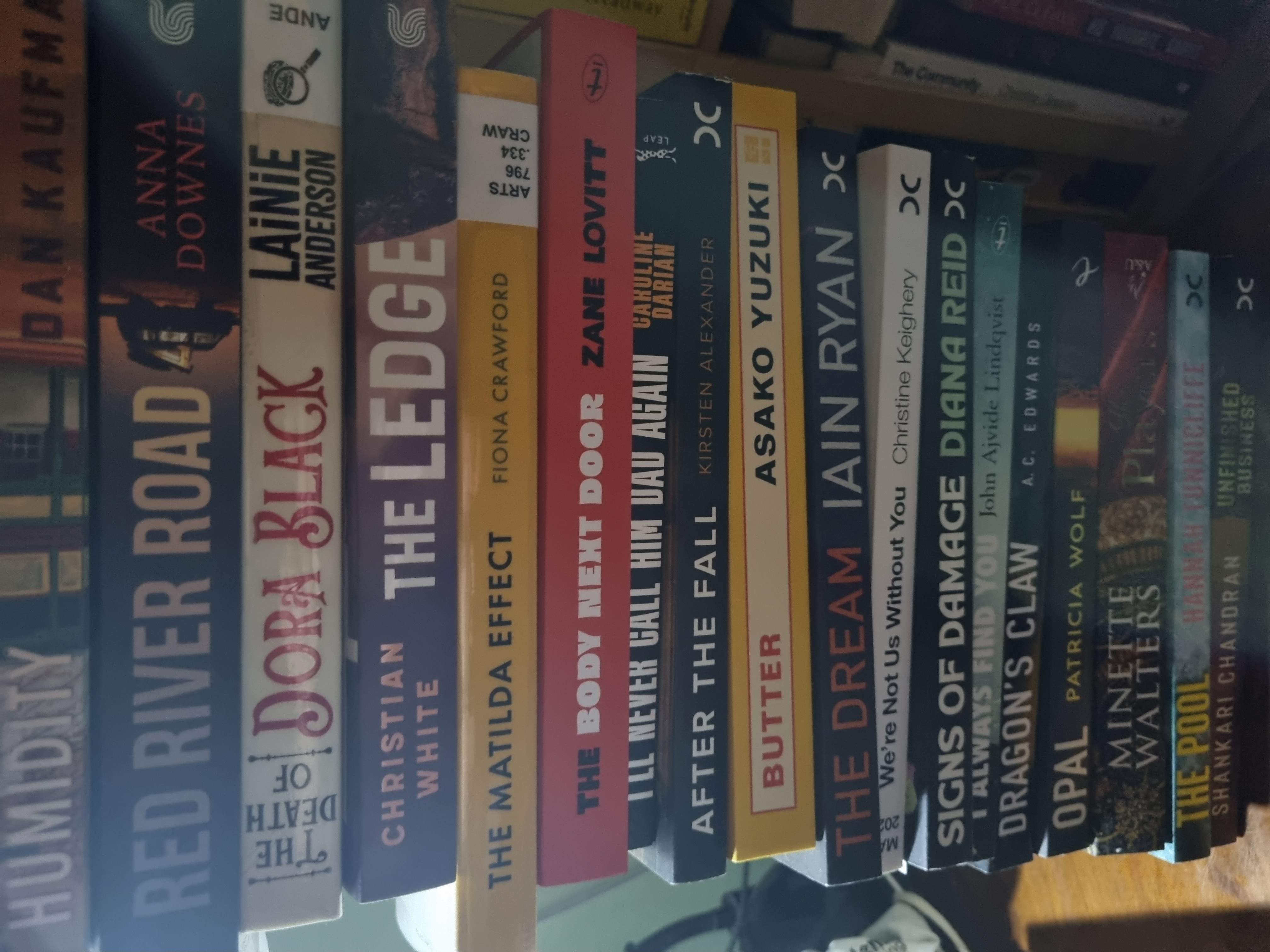
Plan
- Better Left Dead, Catherine Lea (started already)
- Nothing But Murders and Bloodshed and Hanging, Mary Fortune (started already)
- Humidity, Dan Kaufman
- The Freezer, Kim Hunt
- The Private Island, Ali Lowe (release date 25th February)
- 17 Years Later, J.P. Pomare
- Miss Caroline Bingley Private Detective, Kelly Gardiner & Sharmini Kumar (Release date 2nd April)
- Ripper, Shelley Burr
It's still pretty much fantasy. Huge tracts of Western Victoria are still on fire and it's hot enough to melt bitumen. I'm getting there.
Panic

BRONTE NEEDS A PLACE TO LIE LOW.
She posted a drunken rant that went horrifically viral. Now – jobless, friendless and broke – she’s forced to volunteer as a carer on an isolated rural property. She won’t be paid for looking after dementia sufferer Nell, but at least she’ll have a place to stay.
Bronte’s host is Nell’s daughter Veda, who runs spiritual rebirthing retreats. She also claims the rights of a sovereign citizen and rejects the authority of the state, refusing even to register her car. She has acquired a small but devoted following.
Are they harmless cranks, with their conspiracy theories and outrage at government overreach? Or dangerously paranoid domestic terrorists? And what is the dark secret that Nell, in her confusion, keeps harking back to?
Bronte, increasingly uneasy, would be getting far away from the whole place – if she had anywhere else to go.
Panic, Catherine Jinks
In her new novel, Panic, Catherine Jinks provides a timely take on online mobs, conspiracy theorists, and sovereign citizens.
Bronte is a young woman who, along with most of her generation, records pretty much everything about her life online. One drunken rant, though, posted after she found out her boyfriend was cheating on her with her flatmate, has sent her life spiralling out of control. ‘Pussybugs Girl’, as she’s nicknamed, is targeted in an organised, and particularly vicious, harassment campaign.
Being abused and vilified online is one thing, but the threat gets more personal when she’s drugged and filmed on a train. Trying to report it to the New South Wales police, however, doesn’t go so well.
‘Yesterday I was on the train and I blacked out. And when I woke up, I was at Central station.’ My voice started to wobble. I could still feel the horror of that moment – the grogginess, the nausea, the realisation I’d overshot my station by a whole hour …
‘At first I thought I had the flu, but then something happened.’ I swallowed. Braced myself. ‘Someone filmed me while I was out cold, and posted the video on Instagram. I was just lying there, snoring and drooling. I looked dead drunk, even though I wasn’t.’
Her drunken rant about Callum’s unfaithfulness doesn’t help her argument with the older policeman, who either doesn’t understand, or doesn’t want to.
’And anyway, I was doxed, last week.’ His blank expression made me add, ‘A fan of Callum’s released my personal details. On the net. My address and stuff …’
His reaction is the final straw, and Bronte realises it’s not safe for her to stay where she is – too many people know her face, and now know her address. She was probably lucky this time, it was just a drugging, but her final retort to the useless cop is everything:
‘Good job I wasn’t raped, eh? You probably wouldn’t believe that, either.’
Her solution is another online option, the volunteering site HelpX, and a job on a remote property where she can lie low and wait for the next outrage train and a new victim to take the focus away from her.
Which is how she ends up at Bathurst station, where she is collected by Veda and taken to Gwendolynne. Veda, her husband Troy and their assistant Prish run a wellness retreat in the family home. Veda’s elderly mother Nell also lives there.
According to the website … bedrooms were ‘spiritual birthing suites’. Youborn is your key to neuronatal recovery, it said. Youborn will return you to youriginal strength, youriginal wellbeing, youriginal freedom.
The family have been forced to take on Bronte after a social worker intervened when Nell was found wandering by Iris, their neighbour. There’s something in the way Veda is responding to her mother’s needs that should have warned Bronte, though – it doesn’t match at all with Gwendolynne’s motto: Back To You.
The difference is driven home in no uncertain terms when, on the road from the station, Veda is pulled over by the police. There are false numberplates on her LandCruiser, and she goes from wellness guru to sovereign citizen in a hot flash.
‘Legally, this is a personal conveyance, not a motor vehicle. And I’m a living human being who doesn’t recognise or consent to the laws of a corrupt, de facto government.’
As Bronte observes:
She looked quite cheerful. Not the least bit crazy.
Arriving at Gwendolynne, meeting Nell, trying to find a routine in the midst of what seems like a powder keg waiting for a very small spark, Bronte finds herself surrounded by A-grade crazy, complete with an ‘assembly’, quite a few people with a bizarre line in pseudo-legal babble and an elderly lady who is obviously starting to fail, but also has a secret she’s desperate to keep hidden. This is quite a challenge for a young woman with enough problems of her own, who begins to think it might be time to choose between the volatility online or what is melting down in front of her face.
The plot heads into a full-on sovereign citizen confrontation after a bit of a slow build-up, as Nell has an accidental fall, is taken to hospital, and Veda and Troy panic about the supposed takeover of the property by illegal government forces. The dialogue here is so realistically crazy and the pseudo legal-speak on the page evokes a very similar feeling to when it’s encountered in real life – a desperate urge to be anywhere else, which Bronte feels, too. Things aren’t helped by spending her nights in a secluded caravan on the property – amid clear signs somebody’s creeping about in the dark – and her days discovering hidden panic rooms and an arsenal of guns in the house.
As tensions boil over, and the pseudo-legal babble becomes more insistent, it inevitably, ends up in a siege situation, with Nell, Bronte and two local police, Pereira and Yates, held inside the house.
I knew instantly what that noise was. I’d heard it in a thousand movies, though I couldn’t quite believe I was hearing it now. Nell squeaked. Pereira turned. Yates was already edging backwards, hands raised, expression blank.
Framed in the bathroom doorway, a gun barrel was pointing straight at him.
Their only chance of survival turns out to be some combined cunning, and those panic rooms.
Just when you think it’s all calmed down, there’s a final twist that Iris and Bronte, a friendship now forming between the two women, also weren’t expecting.
Iris turned to me, hands on hips. ‘Wayne gave me a piece of paper. He said I was served.’
My jaw dropped. ‘You’re kidding.’
‘Writ of public summons. Not a real one. Some garbage saying I’ve been working for an unlawful global elite system run by international banks and the Pope.’
It will make you wonder just what it takes to make a sovereign citizen stop and have a think about their choices in life, as the threat is back, considerably more insistent, and the women’s options get more and more limited.
As daft as the whole scenario sounds, the sovereign citizen movement is treated fairly in Panic. They aren’t made out to be just weird fools. It’s clearly shown to be a dangerous movement, populated by delusional and manipulated people with very twisted beliefs. Sadly, they can and do pose a threat, and it was sobering to think of those, the police in particular, who have to walk into the real-life versions of this fictional tale.
Cold Truth
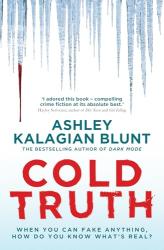
Harlow Close has made a career as an influencer uncovering the secrets of Winnipeg, dubbed 'North America's strangest city'. The region is renowned for its sub-zero temperatures, dropping to minus 40 degrees - sometimes for months at a time. Yet, it's not just the frigid winters and geographic seclusion that render Winnipeg peculiar.
When Harlow's father mysteriously disappears amidst a particularly brutal cold snap, suspicions of foul play arise. It's not like Scott to miss phone calls - and he's been even more cautious sicne that time he was catfished by a romance scammer. Unhappy with the pace of the police investigation, Harlow launches her own search, enlisting her sister Blaise's reluctant help.
As Harlow struggles to uncover what happened to her father, she's forced to question everyone and everything around her - including herself.
Cold Truth, Ashley Kalagian Blunt
Set amid the ferocious cold of a Canadian winter, Ashley Kalagian Blunt’s new novel continues her exploration of the threats of life online.
In her debut novel, Dark Mode, Kalagian Blunt dug deep into the murky world of stalking and the personal toll of never-ending threats. Cold Truth provides another take on some different forms of threats and manipulation, and their impact.
Harlow, her sister Blaise and their dad Scott have a complicated relationship. The sisters are semi-estranged, but Harlow has stayed close to her father since the death of her mother. There’s something bubbling away under the surface about that death, although that’s just part of the fraught backstory of this family.
Despite living in Winnipeg, Canada, dubbed ‘North America’s strangest city’ and renowned for its sub-zero temperatures, Harlow is worried enough about her father to head through a blizzard to his house.
Driving in the storm was a mistake. Snow pummelled the windshield and polished the highway to sheer ice. Harlow’s plan for tonight had been simple – light the gas fireplace, curl up on the sofa with a bowl of maple pecan ice-cream and rewatch Canadian Wild, skipping the predator bits. Animals getting attacked might be reality, but who could stand to see it?
Harlow has always been very public about her life, using her position as an influencer to further her business objectives, running popular tours for tourists fascinated by the city, its weather and reputation. Until her father mysteriously disappears, and her desperate search to find him leaves her trying to find a way to balance that high profile with a threat that is increasingly odd.
http://ucx01y4re2e71w2rm3g3.onion
16 January
To: requests@MortemEt.com
From: anonymous00@PrivateMail.comI have a job I need done within the next 24 hours. The target is in Winnipeg, Canada. It needs to look like an accident or possibly a suicide. Send your fees and what method you plan to use. I’m here waiting for your reply.
Not that Harlow knows about MortemET or the conversation that’s going on in the background when she finally arrives at her father’s house to find he is definitely missing and somebody is creeping around in the house.
A figure dressed in black barrelled out of the house. Before Harlow could process what was happening, a hand slammed into her chest and she tumbled off the landing. Pain exploded through the back of her head.
It turns out the secrets Scott Close may have been keeping from his daughters are only part of the story. There are things that happened in the past in this family, between them and their much-missed mother, that have created odd dynamics. Including with a neighbour who has gone from close friend to antagonist over a snow maze and various other activities on his property. There aren’t many suspects for the police to look at when it comes to trying to find Scott, but Harlow, in particular, isn’t happy with how they are proceeding, and pushes ahead with her own search, discovering a lot of very complicated and weird goings-on in the process.
Wading through all sorts of red herrings and odd byways, Harlow finds herself dealing with a form of catfishing that sends her and Blaise off on a wild goose chase. Eventually she discovers there’s something very wrong about some of the people supposedly on their side, and then there’s the on-off relationship with Blaise. Who now has a boyfriend with some very dodgy connections and seems to be making a lot of money from a pyramid scheme. Meanwhile Harlow’s recently single after her relationship imploded over suggestions her boyfriend was cheating, and her own business is starting to go downhill as she’s increasingly distracted by the disappearance of her father. It’s probably just as well that she doesn’t know what else is going on in the background of all their lives, or in a remote location to somebody unnamed.
Instead of chopping the finger off, the shears jammed on the bone, tearing at the muscle. The old guy howled, bucking against the duct tape, sending drops of blood flying.
Cold Truth is a very different beast from that first novel. This work is built around a frustrating hero figure in Harlow, somebody all action, bluster and desperate decisions. There’s also something very ghostly and multi-threaded about the threats, with similarities to hacking and breaches of digital privacy, and differences in that the world of crypto-currency is central to this story. Although you’d normally expect your hired muscle to be a bit better at it than the man leading this motley group of kidnappers.
The Tall Man didn’t know much more about him, except that he had one point seven million dollars’ worth of Bitcoin in a crypto wallet and had chosen to die rather than give up the key.
As with the earlier novel, there are warnings woven into the narrative, and these could serve as an excuse for some of Harlow’s worst excesses. After all, she is not in control, and doesn’t know she’s being manipulated.
The author has also used the extreme weather to great effect. A Canadian Australian, Kalagian Blunt is obviously aware of how hard it is for anyone who has never experienced it to understand just how cold Canada can be, so chapter headings listing temperatures like –21°C, –30°C and a positively balmy –3°C serve as none-too-gentle reminders that we’re most definitely not in Australia.
The exposed skin on Harlow’s face burned with cold. The frostbite from Thursday was already fiercely painful. Her shoulders curled in, trying to preserve her body heat. Even her teeth were cold. The snow was up to her knees.
The sense of threat and physical pain that the weather brings with it is nothing compared to the psychological pain that Harlow experiences when she finally realises that it’s the things the family has tried to keep hidden, the unspoken resentments and poor decisions, that have led to the situation they now find themselves in. And the sudden, glaring awareness of just how easily expectations, understanding, and belief can be manipulated.
The Accident on the A35
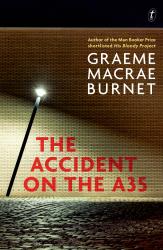
The methodical but troubled Chief Inspector Georges Gorski visits the wife of a lawyer killed in a road accident, the accident on the A35. The case is unremarkable, the visit routine.
Mme Barthelme—alluring and apparently unmoved by the news—has a single question: where was her husband on the night of the accident? The answer might change nothing, but it could change everything. And Gorski sets a course for what can only be a painful truth.
But the dead man’s reticent son is also looking for answers. And his search will have far more devastating consequences.
The Accident on the A35, Graeme Macrae Burnet
Having read the third in the series A CASE OF MATRICIDE very recently I was intrigued enough by the prospect of the two earlier books that I managed to get the 2nd via the local library. Hence it jumped quite a long way up the queue in order to be able to return it.
Luckily this doesn't seem to be a series that is suffering from my backwards approach. Georges Gorski is a fascinating sort of character, bought to life, as I said in the review linked to above, by a writing style that combines wry humour and detailed observations. Everything's wonderfully understated, with a gentle, but skewering analysis of human nature along the way.
In this story, Gorski's personal life is imploding, and his professional life seems to be caught up in the most mundane of small town goings on. What seems like a straightforward death in a road accident twists somewhat after Gorski visits the widow to deliver the bad news. Mme Barthelme, seems surprisingly unmoved by the news of the death of her husband, and her teenage son Raymond, who has some problems of his own, instigates his own search for the truth about his father's whereabouts on the night he died with devastating consequences.
The story turns on the question of personality, and control. The dead man's presence weighed heavily on his household, his behaviour a burden for them all. His beautiful wife might seem a little ineffectual, but she can manipulate, something Gorski must learn for himself. Their son has chafed against the control of his father, and you'd think, his curiosity about his father's activities might be a way to purge some demons, but nothing is ever as straightforward in these novels. Whilst Gorski is busy trying to piece together the timings, and paths that lead to the accident, young Raymond is trying to understand a father who was always aloof. An austere figure of rigid rules and behaviours, the lead up to his own death seems to be the most unpredictable thing about him.
As with the earlier book, this is another masterful psychological study of human nature and small town life. In the small moments, the day to day angst and small humiliations of growing up, and living lives closely observed by those around you, THE ACCIDENT ON THE A35 is as much about the death of a tyrant as it is the lives lived around him.
Three Boys Gone
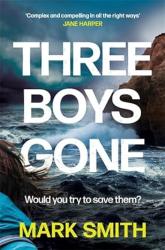
'First rule of rescue: don't create another casualty.'
Grace Disher is about to face every teacher's worst nightmare.
Three of her students are going to die.
On a high school camping trip, three boys slip away for an ocean swim. By the time Grace catches up, the perilous surf conditions are overwhelming the teenagers. If she goes in, she will die trying to save them.
Should she have given her life?
The question haunts Grace as investigations begin and her decision not to attempt a rescue comes under scrutiny. Hounded by conflicted staff, grieving parents and relentless media - all dissecting her actions, all looking for someone to blame - Grace's safety is compromised and she must be careful who she trusts.
And she's not the only one with a secret.
Three Boys Gone, Mark Smith
When three 16 year old boys on a school hiking trip run into perilous surf, the only witness is Grace Disher, the teacher in charge of the trip, who reluctantly defers to the first rule of rescue: don't create another casualty and stands helplessly by as the boys disappear.
Switch then to the remaining boys in the party, and the two other teachers who were with them on the hike as Disher was setting up for the group's arrival at their next destination. It was when she was hiking back in to meet them that she came across these three, who inexplicably it seems, simply ran straight into the ocean in conditions that nobody would think to swim in. Then to the frantic search for a phone signal, the arrival of police, SES and search and rescue. The remaining boys and the two (male) teachers are evacuated out to a nearby town and a motel for the night, but Disher opts (insists) on staying in the area, providing what assistance she can to the searchers, being interrogated by a local cop as to the circumstances of the drownings, and why she didn't try to rescue them.
The story rapidly becomes about that decision - should she have sacrificed her own life in what she could see would be a fruitless attempt to save the boys? As the story is taken up by the media, the witch hunt grows, Disher's safety is compromised, and her home life exposed. Assumptions are made about her competency and there's plenty of hints that a woman, worse still a lesbian, should not have been in the position she was in - in charge.
I have to confess to being very challenged by THREE BOYS GONE. On the one hand, one hell of a premise - should you follow that "rule" of rescue, or should you throw caution to the winds as the only adult in the area. Good point, and one that is well worth considering in these sorts of circumstances, as is the human tendency to blame when the inexplicable happens. On the other hand there's a lot to the delivery of the premise that seemed convenient. A lesbian, a woman, worse still a "not a mother" she stuffed up the risk assessment process, she was there when the boys entered the water, she didn't rescue them from the impossible conditions. It just seemed to take an age for anybody to ask what made the boys do what they did, and where were the male teachers who had been with them at the time? What were they doing? To say nothing of the oddness of the scenario - a bunch of traumatised kids put up in a motel miles from home after such an event, no parents charging in to collect them, a headmaster whose response was frankly weird, and then all IT gubbins which just didn't ever reach the vicinity of the general area of plausibility.
For this reader, as the implausibilities piled up, the inevitability of the twist at the end got more obvious and that original premise disappeared in a soup of stalkery, homophobic, misogynistic byways and assorted red herrings that went off and started to pong.
The Housemate
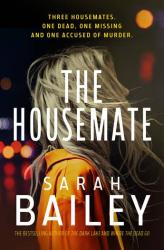
Three housemates.
One dead, one missing and one accused of murder.
Dubbed the Housemate Homicide, it's a mystery that has baffled Australians for almost a decade.
Melbourne-based journalist Olive Groves worked on the story as a junior reporter and became obsessed by the case. Now, nine years later, the missing housemate turns up dead on a remote property. Oli is once again assigned to the story, this time reluctantly paired with precocious millennial podcaster Cooper Ng.
As Oli and Cooper unearth new facts about the three housemates, a dark web of secrets is uncovered. The revelations catapult Oli back to the death of the first housemate, forcing her to confront past traumas and insecurities that have risen to the surface again.
What really happened between the three housemates that night? Will Oli's relentless search for the murderer put her new family in danger? And could her suspicion that the truth lies closer to home threaten her happiness and even her sanity?
A riveting, provocative thriller from the bestselling author of The Dark Lake, Into the Night and Where the Dead Go.
The Housemate, Sarah Bailey
A standalone from the author of the well-known Gemma Woodstock series, THE HOUSEMATE is a story told in two timelines. Back to nine years ago when three housemates were sharing a property, one of them is killed, one goes missing, one is accused of murder. The current timeline sees journalist Oli Groves, who worked on the original murder story as a junior reporter, still a reporter, drawn back to a case she has always been obsessed with, when the missing housemate turns up, possibly as a suicide, at a Dandenong Ranges property.
The basis of this story is an intriguing one. The reasons for the three housemates supposed falling out was never really explained, their lives at the time of the murder never fleshed out, the missing girl never located. The problem is now the housemate accused of murder is out of jail, the missing girl is assumed dead by suicide, and there's something in the past that everyone's trying to keep quiet. Cue Oli back on the case, only this time, reporting has changed, and the paper she is working for have decided that podcasting is the new thing, so Oli is paired up with Cooper Ng, a young, relentlessly cheerful millennial producer. These two are destined to clash, and yet they might also be able to find a way to work together.
That is if Oli can dig herself out of the personal mess that she's buried herself in, and her obsessive nature. Engaged now, to the widower of the original police detective on "The Housemate" case, who was killed in a mysterious hit and run leaving her husband with two small twin daughters to raise. Only he was having an affair with Oli in the past, she was in a relationship with one of the cops that's now on the case, the twins are now older, and he mostly seems to be looking for a live in childcare provider, or something that certainly doesn't feel right. The personal story in this is novel is BIG, and it's complicated, messy and more than a bit overwhelming. In fact, I wouldn't recommend THE HOUSEMATE to anybody with an allergy to huge chunks of personal angst. Needless to say, the ex-boyfriend's the good bloke, the fiance a controlling creep, and Oli seems to be unable to sort out her feelings about the personal or professional. There are times when Ng's relentless upbeatness is a bit of a relief to be honest.
In amongst all the personal stuff there is a crime story lurking, with the story leading up to the original murder likely to explain the current housemate death. Or not. There are plenty of red herrings, complications, missteps and misleading elements in there - more than enough to keep a reader guessing. That aspect of the story was interesting, and cleverly constructed, but for this reader, not quite cleverly enough to have it rise beyond the soap opera threatening to subsume it.
Better Left Dead
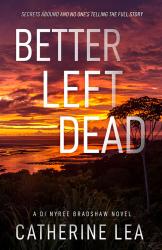
DI Nyree Bradshaw and her team have their work cut out for them once again. Local woman Lizzy Bean has been found dead, garrotted with a piece of wire. Lizzy's property, a 1970s beach house overlooking a pristine Northland bay, is overflowing with rubbish. Inside, the house is even worse.
As Nyree and her team delve into the case, clues begin to reveal an intricate web of connections involving a local crime syndicate, a kidnapped woman, and a group of ex-foster children haunted by the past.
Meanwhile, Nyree's own past is catching up with her. Forever racked by guilt that she has failed her son who is currently in prison for murder, Nyree might finally get a chance to redeem herself in his eyes . . . but it comes at a steep cost.
Better Left Dead, Catherine Lea
TRIGGER WARNING: Addresses foster and orphaned children and child abuse, as well as animal abuse - see expansion below.
The second DI Nyree Bradshaw novel from Catherine Lea, this is a police procedural styled series that is strong on character and sense of place, and no slouch when it comes to plotting and personal complications for its characters.
BETTER LEFT DEAD is an interesting tale based around the death of an eccentric hoarder Lizzy Bean. Lizzy seems to an bit of an unknown in her local area, although there are a lot of people who have a problem with the build up of rubbish and junk around her house. A house which is located in a pristine, sought after area, with views overlooking Northland Bay. Needless to say how she ended up in this house, in this place, is something that Bradshaw's team have to dig to discover, and along the way, they find an intricate series of connections to the past, a dangerous crime syndicate and a kidnapped woman, and, particularly sadly, a group of ex-foster children haunted by their pasts.
That last aspect is haunting for the reader as well, although it's very carefully and respectfully handled, but it is there, hence the earlier warning. It's also balanced up against Bradshaw dealing with the discovery of a previously unknown granddaughter, her fractious relationship with her son who is in jail, and the decisions around ongoing care for the child. With a lovely touch out of the tragedy that made this reader sniffle ever so slightly.
The animal abuse aspect is also carefully handled but it's there and this reader, who particularly struggles with such references, found it discomforting without being so overt as to be confronting.
The hassle for authors who are tackling these sorts of subjects is that they are extremely worthy of exploration and outing. What happens to people in their childhoods has ramifications for lifetimes to come, and despite the fact that these subjects are incredibly difficult for some readers, the avoidance of gratuitousness helps immensely. Bradshaw is one of those characters who can lead her team, and the reader, through a minefield like this, as she struggles to process the outcomes, deals with a messy personal life and battles away on all fronts. Well supported by a good cast of surrounding team members, she's a good character, who is developing into an engaging, and nicely "imperfect" perfect sort of a woman. Up to her elbows in work, battling the mess that became her personal life, harassed, vaguely pissed off, peddling hard.
Nothing But Murders and Bloodshed and Hanging
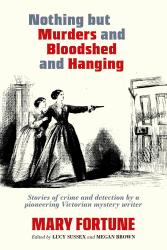
A murderer is identified by a team of oxen. A dead man rises from a watery grave to indict his killer. A phantom hearse gliding through Melbourne’s slums foretells violent death. A seamstress turns detective to avenge her friend’s homicide. A locked-tent mystery.
Such are the themes of Mary Fortune’s ingenious and dramatic crime stories. Between 1865 and 1910 she wrote over 500 of them; they comprise the first ever detective fiction series written by a woman. Set in the outback, on the goldfields, and in the burgeoning metropolis of Melbourne, they offer a vivid account of life and death in colonial-era Australia. Fortune tackled subjects such as murder, armed robbery, bootlegging, and sexual violence with a frankness unprecedented for a woman in the 19th century, in styles ranging from melodrama and Gothic horror to social realism and what is now called noir. This collection comprises 17 of her finest stories, edited and introduced by literary historians Lucy Sussex and Megan Brown.
Born in Ireland in 1832, Fortune arrived in Australia during the gold-rush, which she observed firsthand and depicted in many of her stories. A brief, bigamous marriage to a policeman gave her inside knowledge to write about crime, and over the next 40 years her prolific output was serialized under the title The Detective’s Album in the mass-circulation Australian Journal. She often lived precariously, struggling with alcohol and unable to prevent her son drifting into a life of crime, and preserved her privacy by always using pseudonyms. Her anonymity meant that when she died in 1911 she was almost lost to literary history. Only recently has her true identity and her extraordinary life story emerged. This collection, appearing concurrently with a biography, restores her to her rightful place as a trailblazing crime writer.
Nothing But Murders and Bloodshed and Hanging, Mary Fortune. Edited Lucy Sussex and Megan Brown
Between 1865 and 1910 Mary Fortune wrote over 500 crime stories, set in the Victorian goldfields, Melbourne and the outback. Published initially in newspapers and the like, they form the first detective fiction series written by a woman, although she was published under a series of pseudonyms hiding both her real identity and her gender from the wider world. At the same time as this collection was released a biography of Fortune, and her career-criminal son George, entitled Outrageous Fortunes has been published - which is well worth reading in tandem.
This reviewer was particularly struck by the intended "pun" of the title of the biography and did wonder whether Fortune would be chuffed by it. There's a sly, dry sense of humour at the heart of many of this collection that makes me hope she would. I was also struck most forcibly whilst listening to a talk by the two editors in Ballarat recently, when something was mentioned about the difference between male and female writers of the time. Men having a tendency to embellish (dare I suggest show off) their "education" with florid language, and the inclusion of Latin and other classical language words and phrases. This collection, on the other hand, hints at the gender of its writer more strongly in that the language is pretty direct, there is that sly sense of humour, and a strong sense of support for the underdog. To say nothing of some overt language of affection for other men in the stories that seemed to be hinting at one of two potential scenarios.
The thing that you'll find most about NOTHING BUT MURDERS AND BLOODSHED AND HANGING (a title taken from one of Fortune's own stories), is that it's such a readable and enlightening set of stories. They are all about murder and mayhem, and there's a sense of real knowledge of policing of the time (there is conjecture that her marriage to a local policeman in the Dunolly area might have been part of her source of information) but it seemed to this reader that Fortune must have been possessed of a keen eye and ear for her fellow citizens. As well as that strong sense of justice - perhaps because of the fortunes of her own son George, who went from a street urchin to a career criminal, whilst Fortune was battling plenty of her own demons. She has, it seems, one hell of a personal backstory, and whilst there are possibly glimpses of the struggles in the stories themselves, there are also wonderful depictions of society, the environs, and the sensibilities of the time.
For those of us residing on the Goldfields today there are plenty of references to places that will ring bells, as are there likely to be for those in the inner city of Melbourne, although the mark of the gold diggings is still very visible to this day - mullock heaps, mine shafts and all. It's also a cleverly combined set of stories, taking the reader through a range of subjects including murder, bushrangers, bootlegging, sexual violence and armed robbery. Has to be said that this reviewer found the inclusion of women's viewpoints, sexual violence, manipulation and the difficulties of life in that period for women particularly illuminating. It's a viewpoint that is too often just ignored, or white-washed. Yet another period in history that a return to the restrictions and prejudices of, should be resisted at all costs.
There are also many hints of her Irish background, and the well known antipathy on the Goldfields between the miners and the authorities, leading of course to some of the defining moments in Australian political history. It's sobering to think that her anonymity, and her sad and unfortunate death in 1911 meant that her work, and her identity were very nearly lost. What Sussex and Brown have done (for periods of 35 and 25 years* respectively) is a great service to Australian literature, but also truth-telling in history. Mary Fortune was undoubtedly a trailblazer, and we should know her name, and her work.
* Number of years quoted from my memory from something said at the talk mentioned earlier. It may be slightly inaccurate, but it's close.
Humidity
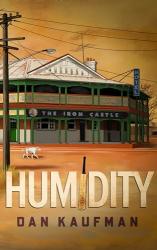
Welcome to an Aussie town where the violence is rampant and the humidity’s hell
Ben doesn’t like being a nude model in a small country town. Then again, the local footballers don’t like their girlfriends ogling Ben.
Broke and desperately lonely, Ben falls for Marty, the ambitious and violent young woman rapidly taking over her brother’s drug and gun-running trade.
Once Ben gets pulled into their dark world of bikies and crime, he discovers a new level of violence that makes the footballers seem harmless – especially when his only friend is then murdered.
Humidity, Dan Kaufman
The opening line of HUMIDITY made me laugh:
Word gets 'round when you're a nude model in a small country town.
That would most definitely get around our nearby small country town, even though it could never be said that we have the rampant violence and hellish humidity referred to in the book's blurb.
An unusual crime novel, HUMIDITY is set in a one of those small towns that has lost most of its economic basis and is slowly dying as a result. The story revolves around Ben, a broke, desperately lonely, lost sort of a young man with a sad family backstory, who lobbed into town and ended up working as a nude model for the local art class. He lives in a tiny, mould infested granny flat at the back of the house his best mate shares with his elderly Granny, and sort of just mooches about. Until he falls for the local barmaid. Marty's whip smart, violent, and rapidly muscling in on her own brother's drug and gun-running business, dragging Ben with her, who frankly is more than a bit sex struck and in way over his head - sex, relationship, business, and friendship wise.
It may take a little while to get into the swing of HUMIDITY because there's a lot of nothing in Ben's life, and his lost and directionless act plays out slowly, and in a slightly meandering manner. Until it's not anymore, and there are bikies, drugs, guns and violence aplenty, as well as some athletic sex and unexpected interpersonal relationships building. The story is kind of less a murder mystery, although there are dead bodies, and more how the hell are these people going to keep living mystery though. As well as a little too realistic a portrayal of a lost young man who got himself into the wrong company and missteps constantly in his attempts to get back out again.
Slyly funny in places, mightily violent in others, the build up is steady, the resolution twisty and unclear, and the reality of the whole thing shone, sadly, through.
The Freezer
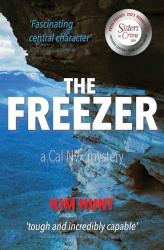
In the endless tracts of the New South Wales bushland Ranger Cal Nyx finds a dead body under unusual circumstances. It soon becomes apparent this is a historic death. Growing attention on the crime puts the blowtorch to a murderer who’s managed to evade justice. For now.
Detective Inspector Liz Scobie leads the police investigation while her partner, Nyx, uses her own considerable - some might say unorthodox - methods to chase down a killer. With speculation growing in the small community, someone privy to information becomes a new target for the killer.
Join Nyx and Scobie in their dogged pursuit of a bold predator with everything to lose.
The Freezer, Kim Hunt
The third Cal Nyx novel, THE FREEZER, would possibly work as a standalone, but the connections between this and the second novel, THE QUARRY in particular, make the characters here make a lot more sense. Nyx and her partner, DI Liz Scobie, her cousin Dif, and boarder Spike (complicated) are a great group of real feeling people and there's a backstory to how they all got here, together.
Hunt is from New Zealand, but this series is set in Australia - New South Wales - where Nyx is a ranger, working way out in the bush. She comes and goes from her city base, a house that was left to her, and the job, where, during a work outing to check the state of bush trails and general maintenance after a storm she comes across a dead body in unusual (maybe unless you're a ranger) circumstances. It may be an historic death, but the discovery creates attention, and a murderer who has evaded justice until now, is worried that may all be about to implode. Whilst Nyx's partner, DI Scobie is leading the police investigation, Nyx is busy deploying her own, somewhat unorthodox methods in a small community, where it turns out, something that she unearths becomes very dangerous information to know.
Nyx is one of those characters who leaps off the page at the reader. Physically capable, emotionally not always so much, she's loyal, hardworking, brave, and a bit daft on occasion. It's rewarding to read a female character who is independent, strong and good at her job, despite the physical challenges, and remote locations she's working in. Her partner, DI Scobie is a good cop too, and whilst they don't work "together" as such, they compliment each other, when Nyx isn't driving Scobie mad. And then there's Dif - who goes way back with Nyx, and is capable, and complicated all at the same time. That backstory from THE QUARRY would be handy to know although there are hints about the past and the reality of Dif's life in this novel.
All these books come with intriguing plots, and the build up of that cast of characters, with some social commentary sprinkled in there for good measure. They are a bit on the gritty side without falling into noir, emotional without being over the top, much like Nyx herself, who is very much a female working class hero.
The Private Island

New Year's Eve, Loloma Island, Fiji. At one of the most exclusive island resorts in the Pacific ocean, the champagne is poured, the fireworks are ready, and the countdown to new year is just beginning. It's set to be a night that no one will forget.
Especially when a body washes up on the shore...
But it's impossible to find answers when everyone here has a motive.
The billionaire's daughter, glamorous, untouchable, hungry for her inheritance.
The start-up founder, out of money, and out of time.
The young dive instructor, in way over his head and struggling to stay afloat.
The husband, blinded by desire, in all the wrong ways.
And the lover, hidden in the shadows, where no one can see them....
One person's holiday of a lifetime is about to be the last they'll ever have.
The Private Island, Ali Lowe
Not for a moment would this reviewer wish to suggest that this is a time in history when the murder of an obnoxious rich person, on a luxury island, busily engaged in being obnoxious and threatening to all and sundry is an enjoyable idea, but it did come across, in this novel, as particularly pleasing. In a not as uncomfortable as as you'd think way.
THE PRIVATE ISLAND by Ali Lowe is a take on a locked room scenario, combined with some filthy rich unpleasant people and some not so filthy rich, but guests as well people, who all come together with a lot of motives to want somebody dead. As the blurb describes the main players:
The billionaire's daughter, glamorous, untouchable, hungry for her inheritance.
The start-up founder, out of money, and out of time.
The young dive instructor, in way over his head and struggling to stay afloat.
The husband, blinded by desire, in all the wrong ways.
And the lover, hidden in the shadows, where no one can see them....
This list doesn't include a deeply put upon wife, an estranged and angry sister, and a quietly determined and clear-eyed Head of Housekeeping and Aunt.
It all comes together in a very engaging combination of characters, and idyllic setting. A tropical island preparing to see in the new year with a masked party, champagne, fireworks and a few more deaths than the staff are quite used to dealing with. Whilst one death seems natural, the second, on the other hand, is quite obviously anything but. The problem is that there are more than enough suspects, almost too many of them really.
THE PRIVATE ISLAND very quickly became very compulsive reading. Got to love an author with the skill to write deeply unpleasant people with this much joie de vivre. The author's that is - the characters demonstrated just how money does not make you happy, or human for that matter. The standout "investigator" in the bunch is definitely housekeeper Una although the put upon wife Kitty, eventually emerges from her internal conflict to become both an ally, and a lot more that's particularly unexpected.
The setting serves as a great exclusive locked room resort, but there's also connections between some of the characters and the place which help to bring the staff and the client's together when required, and all the while, there's trouble brewing, and murderous intent that includes the distinct possibility that there's more sympathy for the main suspect than there ever could be for the victim.
Right from the very start THE PRIVATE ISLAND was engaging, entertaining, and an excellent whodunnit. The why always seemed pretty obvious, the only mystery there seemed to be why it took so long for somebody to kill a person that obnoxious, but the lovely twist in the tail was that second to final reveal. It was so... base, so nasty, so apt. And then there's an ultimate reveal.
Miss Caroline Bingley, Private Detective
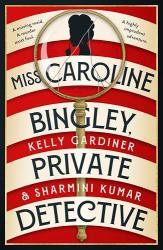
A missing maid. A murder most foul. A highly imprudent adventure. Only her fine eyes can uncover the truth.
Two years after the events of Pride and Prejudice, Miss Caroline Bingley is staying at her brother's country estate within an easy ride of Mr and Mrs Darcy's home, Pemberley, and wondering if there's more to life than playing cribbage and paying calls on country neighbours. So when Georgiana Darcy's maid, Jayani, vanishes - and worse, Georgiana disappears in search of her - Caroline races to London to find them both, and quickly discovers a shocking, cold-blooded murder.
Soon Caroline and Georgiana are careering through the gritty, grimy underbelly of London assisted by Caroline's trusty manservant, Gordon, and demanding answers of shady characters, police magistrates and mysterious East India Company-men to discover the killer. Along the way they uncover the cost of Empire on India and its people ... and Miss Bingley's incomparable powers of investigation. As Caroline puts her superior new talents to work, she finds out exactly what an accomplished, independent woman with a sharp mind and a large fortune can achieve - even when pitted against secrets, scandal, and a murderer with no mercy.
Miss Caroline Bingley Private Detective, Kelly Gardiner & Sharmini Kumar
Fans of Jane Austen are going to feel right at home with Miss Caroline Bingley for a lot of reasons - the style of this novel fits right into the period, the central characters are reimagined versions of those straight out of Pride and Prejudice, and the sense of place and time is strong. Granted Miss Bingley and her dear friend Georgiana are considerably more ... what's the word .. active, maybe freer than the original version. Granted also it's been a long time since I read Pride and Prejudice and I'm no Janeite (if that's the right word).
Set a couple of years after the events of Pride & Prejudice, Miss Bingley is visiting her brother's estate in Derbyshire, bored by the cold weather, and light amusements. Despite her loss in the battle for Mr Darcy's affections she has remained close to Georgiana, Mr Darcy's younger sister, and it is when her Indian maid, Jayani, disappears from Pemberley that Miss Bingley turns Private Detective and she and Miss Darcy head off to London in pursuit of the maid, accompanied by Bingley's loyal manservant Gordon.
Alas the tracing of Jayani (aka Jade) plunges them into the investigation of a brutal murder, and finds them face to face with a world that previously would not have existed for such privileged people, let alone women. Deep in the world of poverty, and brutal colonialism this novel takes the reader into the truth of the East India Company, the cruelty, exploitation and abuse that provided abject misery for many, and luxury and wealth for the few.
It's hard to avoid the feeling that the authors of this novel have purposely dragged a character who was more than a bit haughty and conceited into a world that suits her personality, and allows her to expand her expectations and interests. She comes across in this novel as witty, sharp, pointed and more than a bit opinionated, and that sits considerably more comfortably with the role of intrepid sleuth, someone whose disapproval is now able to be targeted more aptly.
Cosy in nature, mostly because of the style, and leaving aside the question of a brutal murder at its heart, MISS BINGLEY, PRIVATE DETECTIVE is obviously a novel that will work well for those of the Janeite persuasion. It would work for general fans of cosier novels as well. It's engaging and highly entertaining, sticking with its sense and sensibility all the way through.
Ripper
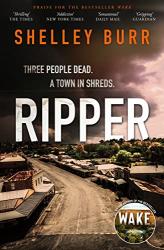
Gemma Guillory knows her once-charming town is now remembered for one reason, and one reason only.
That three innocent people died. That the last stop on the Rainier Ripper's trail of death seventeen years ago was her innocuous little teashop.
She knows that the consequences of catching the Ripper still haunt her police officer husband and their marriage to this day and that some of her neighbours are desperate - desperate enough to welcome a dark tourism company keen to cash in on Rainier's reputation as the murder town.
When the tour operator is killed by a Ripper copycat on Gemma's doorstep, the unease that has lurked quietly in the original killer's wake turns to foreboding, and she's drawn into the investigation. Unbeknownst to her, so is a prisoner named Lane Holland.
Gemma knows her town. She knows her people. Doesn't she?
Add comment